| Q: |
I heard that babies don't smile until six weeks. I'm sure she smiled at two weeks; Is this possible?
| | A: |
A baby's first social smile is thought to happen at around four
to six weeks, although it may be seen earlier and dismissed as gas.
However, from an early age a baby can imitate the facial gestures of
parents by, for example, moving her tongue and widening her eyes, which
may make parents think that she is smiling.
Most parents say they
see their baby's first smile between six and eight weeks. This is an
important milestone since it means they have interacted with their baby,
which is very rewarding. Psychologist Steve Biddulph suggests that
newborn boys make less eye contact and smile less than girls. This means
that we have to make an extra effort to interact and chatter with boys,
so that they grow up to be toddlers who can socialize as well as girls.
If your baby does not smile by the time she is three months old,
discuss this with your pediatrician.
|
| Q: |
What is the bonding process and how can I encourage it?
| | A: |
Bonding is the attachment that develops between both parents and
their baby. It makes parents want to shower their baby with love and to
protect and nourish them, helps parents to get up in the middle of the
night to feed their baby, and makes them attentive to their wide range
of cries. It is beneficial for babies in promoting their security and
self-esteem and is also believed to help a child's social and cognitive
development. Bonding is easier if you aren't exhausted and, as at first,
caring for a newborn can take all of your attention and energy,
especially for a breast-feeding mother, it's helpful if fathers or
friends can give a hand with everyday chores, as well as offer emotional
support.
Breast-feeding can help
with the bonding process, but there are lots of ways besides
breast-feeding to bond with your baby. Touching and stroking your baby
develops a bond, and talking and singing to her during feeding and
playtime encourages your baby to respond to you, which helps you feel
closer. Whether you're breast- or bottle-feeding, make eye contact
during feedings and hold your baby close while you feed her. In some
cases, for example if your baby is in a neonatal care unit, you may
worry about not being able to bond. However, the staff will encourage
you to touch and hold your baby and be involved in her care. If you are
feeling uncomfortable with your feelings toward your baby, this may be
an early indication of postpartum depression and it would be best to
seek professional help.
|
| Q: |
My partner doesn't feel as if he has bonded with our daughter yet. What can he do?
| | A: |
Although dads frequently yearn for closer contact with their
babies, bonding frequently occurs on a different timetable for dads,
partially because they don't have the early contact of breast-feeding
that many mothers have. As a result, some men find that as your
confidence grows, so does their uncertainty about their relationship
with their baby. On a positive note, men today tend to spend
significantly more time with their children than fathers of past
generations did.
Talk to your partner
about what you like about his interaction with your baby. It's good for
fathers to realize that bonding with their baby isn't a matter of being
another mom and, in many cases, dads share special activities with their
infants and develop their own unique relationships, offering fatherly
qualities that the mother cannot provide. Both parents benefit greatly
when they can support and encourage each another. Early bonding
activities that you could encourage your partner to get involved in
include bottle-feeding your baby (doing a night feeding can help give
you a rest); diaper changing; bathing and massaging; going out for a
walk with either a baby carrier or a carriage; or simply enjoying some
playtime with your baby. Bonding is a complex, personal experience that
takes time. As long as a baby's basic needs are being met, she won't
suffer if a bond isn't strong at first. If you're still concerned, ask
your midwife or pediatrician for more advice.
|
| Q: |
We've had so many visitors I feel I haven't gotten to know my baby yet. What do you suggest?
| | A: |
Perhaps if you have been inundated by visitors initially things
may soon start to calm down. If not, then either you or your partner
need to be politely assertive and explain that you are tired and request
the visit just be for 10 minutes or put off until the weekend, or a
more convenient time. It is not rude to ask for some space. Then shut
the door, ignore the telephone, and enjoy some time with your baby.
Beyond crying, your
baby's first attempts to communicate are in the form of eye contact.
Look into her eyes from about 8–12 in (20–30 cm), the best distance for
babies to focus. Touch her gently, stroke her, smile at her, and talk or
sing to her. Look at her movements, listen to each sound she makes, and
give her your full attention. You will teach your baby to make sense of
the world by these early communications. Often, the best time to
communicate is after a feeding when your baby is relaxed and content.
Pleasurable activities also include sharing a bath, going for a walk,
singing to your baby, or giving a massage. Anything that both the
parents and baby can enjoy. It may be nice to devote an evening each
week for “family time,” when you spend time all together. Try to keep
the commitment and avoid interruptions.
|
| Q: |
What is baby massage?
| | A: |
Baby massage
involves lightly stroking your baby's skin in a gentle, soothing rhythm
. Babies love to be touched and it's an important part of their
growth and development. Baby massage is a great way to bond with your
baby and is also thought to help to soothe common baby ailments, such as
colic and dry skin.
Researchers from
Warwick Medical School and the Institute of Education in England found
that massage helped lower stress levels in babies, which in turn helped
them to sleep better. Also, massage provides a good source of sensory
and muscle stimulation, which is beneficial to all babies, but may be
particularly good for babies with special needs, such as Down syndrome,
and there has also been evidence that premature babies in neonatal care
units who are touched more put on weight more quickly and are ready to
go home earlier than babies who are not touched as much. Baby massage
can also give you more confidence as a parent since it helps you
communicate with your baby. Ask your midwife or doctor for information
on baby massage classes in your area. There are also plenty of websites
that offer guidance. The International Association of Baby Massage is a good source of information.
|
| Q: |
My baby cries continually and I'm really finding it hard to enjoy time with her. Is this normal?
| | A: |
Bonding is the attachment that develops between parents and their
baby and this can sometimes be affected if you are worn down by
constant crying. The first thing to do is check with your pediatrician
to make certain the baby is well and healthy. Although your baby is not
doing herself any harm, crying can be stressful and worrying for
parents. If your baby cries continually despite your best efforts to
calm her down, it's easy to feel rejected. It may help to remind
yourself that bonding is a process, and not something that has to happen
within a certain time period after the birth. If you are worried that
the bonding process is being affected, try to recruit some extra support
from your partner, friends, or family to improve your situation. Some
practical methods to try to reduce your baby's crying and promote the
bond between you include getting in the bath together; walking using a
baby carrier (even around the house); or baby massage.
|
| Q: |
Is it too early to play “games” with my month-old baby?
| | A: |
In the first month, your baby sleeps for around 16 hours a day.
Although this doesn't allow for much play time between feedings,
changes, and baths, it doesn't have to mean you don't play with your
child at all. There are plenty of ways to combine play with the everyday
care of your baby. For example, you can sing to her while you change
her diaper or play peekaboo—put your hands in front of your face, then
take them away quickly and say “peekaboo” (by eight to ten weeks she'll
start to remember what happens, and will gurgle with delight). Listening
to music together is fun—try rocking and patting in time to the beat;
and babies like to play with different textures—stroke different fabrics
against her hands and arms and see her responses. When you are out, add
a mobile or suitable toy to the carriage.
At about eight weeks,
your baby starts to make more sounds, such as coos and chuckles, and you
can start to have a “conversation” together. Also, it's never too early
to join a postpartum group or mother-and-baby group, which promotes
play and allows you to spend time with your baby and meet other moms.
|
| Q: |
When should I put my baby on her tummy?
| | A: |
Even as a newborn, you can let your baby spend time on her tummy
when she is awake to help strengthen her neck and shoulders and help her
head control. It's important that your baby doesn't spend all her time
lying on her back, as over time this can cause the head to become
misshapen and “flattened” on one side. When she is older, lying on her
front will help her to learn to crawl. Supervise during “tummy time” and
be ready to help if she gets tired or frustrated; she will gradually
get stronger. However, never put your baby on her tummy to sleep since
this could increase her risk of SIDS.
|
| Q: |
How can I help my baby learn?
| | A: |
As your baby becomes more able to explore her surroundings and
interact with people, you can provide opportunities and a safe
environment for her to learn and develop. For example, if you respond to
your baby's gurgling sounds with sounds of your own, she will be
encouraged to keep using her voice for expression. Providing plenty of
stimulus in the form of rattles, toys, and singing is also beneficial.
Your baby's sense of touch is developing and it's a good idea to provide
objects that have different textures, shapes, and sizes for her to
explore. You can introduce a baby gym with interesting objects that
dangle for your baby to swat at. Your baby's sight develops quickly, so
providing plenty of visual stimulus helps her develop and learn. Spending time on her tummy also helps her to see the world from a new perspective
.
Be aware that there
are times when your baby will have had enough stimulation and that some
babies prefer more stimulation than others. It's important to recognize
the signs and let your baby take a break.
|
| Q: |
How far can my two-week- old see?
| | A: |
A newborn is near-sighted and can see only blurry shapes in the
distance. Perfect vision is considered to be 20/20, and a newborn has
20/400 vision. This means your baby can focus on your face from her
feeding position at about arm's length (shoulder to elbow) but can't see
much beyond that. Your baby's sight develops quickly. At about two
weeks, she will pay more attention to your face, and any sudden movement
may attract her gaze. By three months, she can recognize the outline of
your face as you enter a room. Human faces are one of a baby's favorite
things, especially a parent's or their own face. Placing a mirror at
your baby's eye level can be a great toy. As her eyesight develops, you
may catch her gazing out of a window or at a picture on the other side
of the room. At about six to eight months, she will see the world almost
as well as an adult does.
|
| Q: |
Can a newborn see colors yet?
| | A: |
Babies may see color from birth, but have difficulty
distinguishing similar tones, such as red and orange. As a result, they
often prefer black and white or high-contrast colors for the first few
months. They're attracted to bright colors and sharp outlines, whereas
soft pastel colors are hard for them to appreciate, so keep this in mind
when buying toys and books. Between two and four months, color
differences become more clear, and your baby starts to distinguish
between similar shades. She'll probably show a preference for bright
primary colors and more detailed designs and shapes.
|
Bonding over time Allowing your feelings to grow and develop
If you don't
feel instant love for your baby, rest assured that bonding is a process
and not something that has to happen immediately the birth.
For many parents, bonding is a result of everyday caregiving. You
may not realize you have bonded until you observe your baby's first
smile and suddenly realize that you are filled with joy and love. Enjoy
and cherish your growing feelings; bonding with your baby, whenever
this occurs, is one of the most pleasurable aspects of baby care.
How to massage your baby
You can incorporate a
massage into your baby's daily routine. Massage him in the morning,
before you dress him, or make this part of his bedtime routine,
massaging him after his bath, or before you get him ready for bed, which
is a perfect way to settle him before bedtime. You can rub oil, such as
sunflower oil, into your palms and massage him with gentle strokes.
Make sure the room is comfortably warm.
Massaging the head:
Stroke his cheeks and forehead from the middle to the sides.
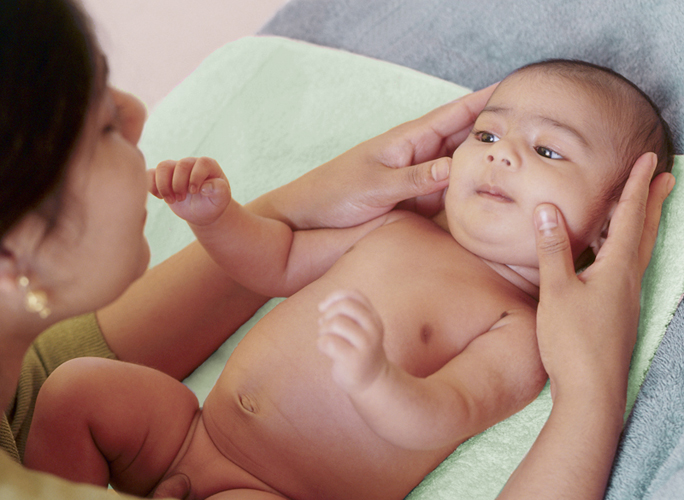
Tummy and chest:
Very gently, stroke down his chest and then make circular movements over his tummy.
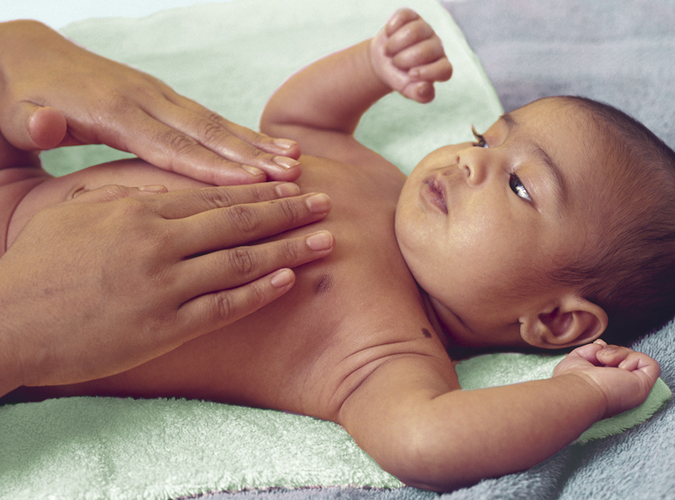
Foot massage:
Use your thumb to stroke from the heel to the toe, and then gently massage each toe.
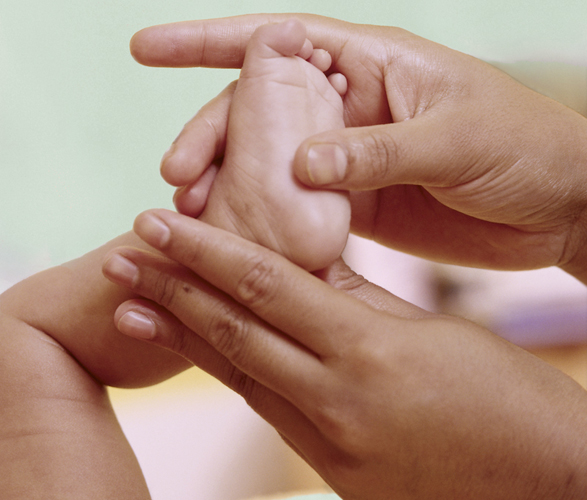
NOTE
Taking time to get to know your baby—talking, touching, and caring for her—slowly helps to cement a lasting love
Baby bonding Your feelings for your baby
“Baby bonding” is a phrase
often used to describe the strong emotional feelings you have toward
your newborn, and the overwhelming sense of wanting to love and protect
her. Research shows that babies need this emotional interaction with you
to help their development.
| Q: |
Will I bond with my baby immediately?
| | A: |
While some parents feel this bond right away, bonding can often
be a gradual process that develops as you get to know your baby. Holding
her as soon as possible after birth, especially skin-to-skin, can help
form an early bond. Your baby will already know the sound of your voice
and will immediately respond to you, so talk to and smile at your baby
as much as you can.
|
| Q: |
How does breast-feeding help bonding?
| | A: |
Breast-feeding is an ideal way to enhance the bonding process.
It's a wonderful opportunity to be close to your baby while giving her
essential nourishment. Also, breast-feeding releases oxytocin, known as
the “love hormone,” so is nature's way of creating a bond between you
and your baby.
|
| Q: |
Are there other ways to bond?
| | A: |
Bottle-feeding can also be a special time to be close to your
baby, giving you a chance to hold your baby close and make plenty of eye
contact. Bathing and diaper changing, as well as being practical tasks,
are good opportunities to interact with your baby, helping you feel
close to your baby and providing her with reassurance, and baby massage
is a good way to feel closer to your baby. As your baby grows, she will
start to interact more, responding to your voice and smiles with smiles
and coos of her own. This is a perfect time to start having
“conversations” with your baby—talk to her in a singsong voice and then
pause to wait for her “reply.” Through caring, nurturing, and
interacting with your baby, you will be building a bond that will last a
lifetime.
|
Skin-to-skin:
Your baby will feel comforted by close contact and the warmth of your skin.
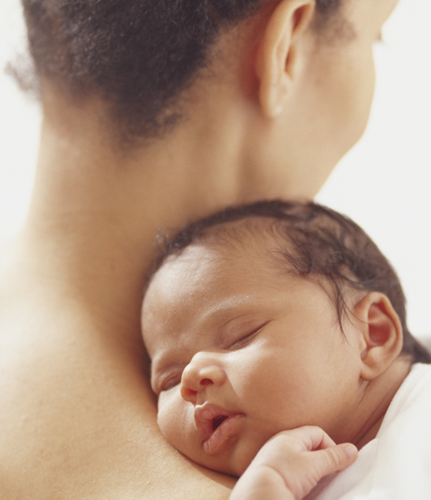
“Talking” together:
As your baby grows, you will be able to interact more and more.
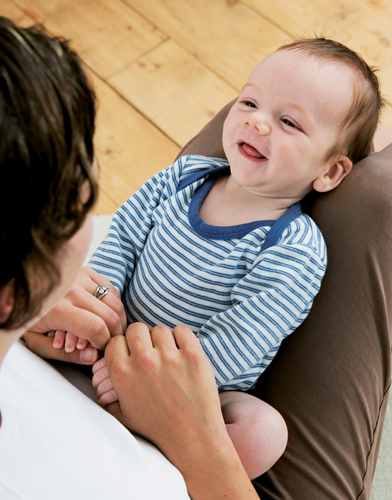
Loving gaze:
Looking into your baby's eyes helps to strengthen the bond of love between you.
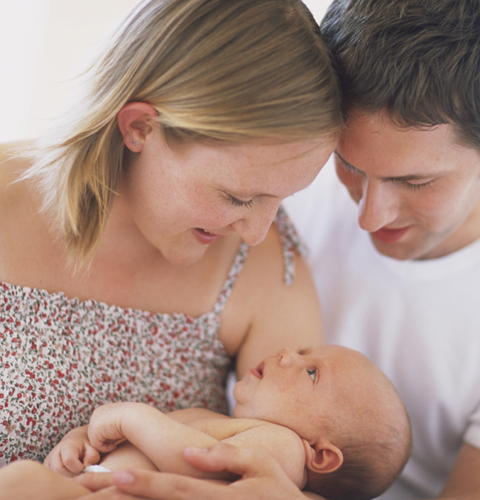
Myths and misconceptions Is it true that…
| Q: |
Babies are brought by the stork?
| | A: |
This myth comes from the so-called “stork beak marks,” which are very common on the skin of newborn babies.
These marks (otherwise known as stork bites or capillary hemangiomas)
are due to the distension of tiny blood vessels in the skin, but they
don't hurt, and your baby won't even know she has anything there. These
marks tend to fade gradually without treatment.
|
| Q: |
Breast-feeding babies need extra vitamin D?
| | A: |
Not
true! Except in extraordinary circumstances (for example, if the mother
herself was vitamin D deficient during the pregnancy).
Babies store vitamin D during the pregnancy, and a little outside
exposure on a regular basis should give a baby all the vitamin D she
needs.
|
| Q: |
You should wash your nipples before feeding?
| | A: |
This isn't
true. Washing your nipples before each feeding makes breast-feeding
unnecessarily complicated and washes away natural, protective oils. Don't wash your nipples too often—daily bathing is enough—and expose them to air whenever possible.
|
|